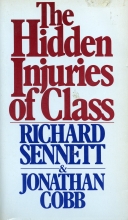

|
|

The Hidden Injuries of Class
Sennett, Richard; Cobb, Jonathon
Publisher: Random HouseYear First Published: 1966 Year Published: 1972 Pages: 275pp ISBN: 0-394-46212-2 Library of Congress Number: HD8072.s487 Dewey: 301.44'42'0973 Resource Type: Book Cx Number: CX7452 Sennett and Cobb look at human relations between people of different classes and analyze everyday life and ordinary situations to identify class signals that make people feel inadequate. Abstract: "It's not what you are, but what you do." This is the notion that Sennett and Cobb oppose in The Hidden Injuries of Class. They analyze everyday life and ordinary situations to identify class signals that make people feel inadequate. Their book looks at human relations between people of different classes. It is a sociological description of class conflict that focuses on how workers feel when addressing their bosses, and how individuals feel when dealing with people in a higher standing. The conclusion advocates the end of judgement based on success in the most desirable jobs and materialistic factors. Along with an introduction and a conclusion, there are two parts to the book: The Sources of Injury, and Dreams and Defences. Sources of Injury claims that, "dignity is as compelling a human need as food or sex," while Dreams and Defences discusses how the psyche defends itself from society in one of two ways: alienation or dream-chasing. The freedom to live as one desires and to pursue goals that are more prestigious is appealing enough to ward off the judgements of the upper class. "If I let the dream of a common dignity grow strong in me, then I want the barriers of privilege removed so that I can develop this potential." In the conclusion it is established that the remaining hierarchy in society and the scales by which we judge ourselves and others will result in revolution unless we achieve true egalitarianism through dignity for all. [Abstract by Mia Manns] Table of Contents Personal Acknowledgements Foreword Introduction Hidden Injuries Part One The Sources of Injury Badges of Ability Sacrifice and Betrayal The Uses of Injured Dignity Part Two Dreams and Defense The Divided Shelf Freedom Conclusion A Flawed Humanism Afterword, by Jonathan Cobb Related Writings of Interest Subject Headings |